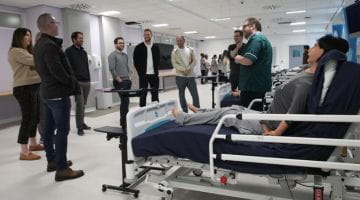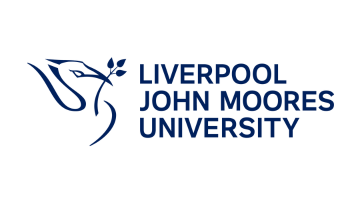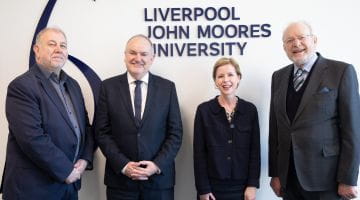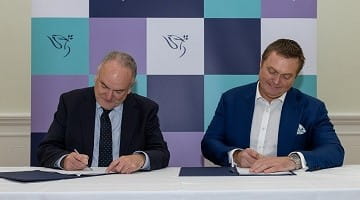Why study this course with LJMU?
- LJMU ranked 18th in the UK for product design (The Guardian University Guide 2025)
- LJMU ranked 15th university in the UK for general engineering degrees (The Times UK University Rankings 2025)
- Design-led curriculum and opportunities to exhibit at the University's annual Product Innovation Show
- Teaching delivered in well-equipped laboratories with state-of-the-art software plus excellent technical support
- All students receive a personal copy of SolidWorks 3D CAD software and access to all Autodesk products
- Thriving student industrial design society
- Option of completing a year-long industrial placement or International module
About your course
The professionally-accredited BSc (Hons) Product Design Engineering at Liverpool John Moores University combines skills development in traditional hand-generated design work such as sketching, drawing and physical model making, with the latest computer-aided design techniques.
The Product Design Engineering degree gives you the opportunity to test your creativity and develop technical skills in using the latest CAD technology so that you will be able to take ideas from product conception, design and analysis, right through to production.
This is a hands-on course in which you will have access to CAD suites loaded with the latest 3D visualisation software, a purpose-built creative design studio, an advanced manufacturing laboratory and modern engineering laboratories.
The course has been developed in partnership with industry experts so that it is relevant to the needs of employers and you will be encouraged to take the year-long work placement option to get a taste of what its really like to work in the design industry.
Additional course costs
Throughout the course students can expect to incur expenses over and above their ordinary living costs. The faculty will provide certain basic design materials; above this students are expected to provide their own design materials.
Course modules
What you will study on this degree
Further guidance on modules
Modules are designated core or optional in accordance with professional body requirements, as applicable, and LJMU’s Academic Framework Regulations. Whilst you are required to study core modules, optional modules provide you with an element of choice. Their availability may vary and will be subject to meeting minimum student numbers.
Where changes to modules are necessary these will be communicated as appropriate.
Core modules
Core modules
Optional modules
Core modules
Professional accreditation
This degree is accredited by the Institution of Engineering Designers.
Strong links with companies in the region ensure that course content is informed by the latest developments in computer aided design, so you can be confident that the skills and knowledge you will gain on the course are exactly those required by employers.
These connections are invaluable should you decide to take the sandwich option and spend a year on industrial placement.
Your Learning Experience
Excellent facilities and learning resources
We adopt an active blended learning approach, meaning you will experience a combination of face-to-face and online learning during your time at LJMU. This enables you to experience a rich and diverse learning experience and engage fully with your studies. Our approach ensures that you can easily access support from your personal tutor, either by meeting them on-campus or via a video call to suit your needs.
Teaching styles include lectures supported by small-group tutorials, and design workshops, projects, enterprise activities, online activities, field trips and laboratory work. Projects provide opportunities to expand your skills to the stage where you are building and testing your own prototype designs.
Work-related Learning
Local companies contribute to the design and development of this course and in fact many of them offer work placements to our students. These placements offer an invaluable opportunity to join a commercial company for a year and put all you have learnt in the first two years into practice.
We strongly recommend that you take up this opportunity as it will give you a taste of what its like to work in the real world of design and it will give you a professional edge when you come to negotiate your way through the graduate job market.
"DriveWorks is a UK based company with global software sales to manufacturing companies. We have been involved with LJMU for several years providing undergraduate internships and 18 month Graduate Training Schemes for Engineers and Product Designers."
Maria Sarkar, VP and Owner, DriveWorks
"The best feature of the programme is its sandwich year. This enabled me to develop my graduate skills as well as my design and technical knowledge. This definitely increased my employability after I graduated. I was able to experience many different aspects of the design world throughout the four year programme and would highly recommend it."
Phil Jones, recent graduate
Dedicated personal tutor, plus study skills support
The School is a supportive environment in which to study and your tutors are committed to ensuring that you reach your full potential at LJMU. From the moment you enrol at LJMU, you will be assigned a personal tutor who will work with you on setting targets for yourself as part of your personal development plan, and discuss one-to-one any course-related issues should you need to.
Assessment varies depending on the modules you choose, but will usually include a combination of exams and coursework.
For many of the design and enterprise modules, you may be expected to work in teams and produce exemplar work for your design portfolio.
Your tutors will give prompt and constructive feedback via Canvas (our virtual learning environment), face-to-face or in writing. This will help you to identify your strengths as well as the areas where you may need to put in more work.
Where you will study
This programme is delivered in the Byrom Street complex of LJMUs City Campus. Here you'll find high-quality lecture theatres, meeting and seminar rooms plus social spaces and a large café. The Avril Robarts Library is just minutes away on Tithebarn Street.
Course tutors
-
 Lecturer/Senior Lecturer
Lecturer/Senior Lecturer -
 Reader
Reader -
 Lecturer/Senior Lecturer
Lecturer/Senior Lecturer -
 Programme Leader
Programme Leader


What I've found to be exceptional about this course is that it not only equips the student with the skill and knowledge to design great products, but also gives the student expertise to successfully bring these products to market through the Design for Manufacture and Enterprise Development modules. This course has brought me a long way towards achieving my dream of developing products with the potential of being iconic designs.
Career paths
You will enjoy varied career opportunities both in the UK and overseas with a BSc (Hons) degree in Product Design Engineering.
Design is a growing sector, despite the recession the profession continues to expand, offering opportunities in many different industries. Increasingly complex product design and manufacturing processes should mean designers will continue to enjoy good employment prospects.
Starting salaries for graduates vary according to the size and type of employer; salaries in London are likely to be higher. Self-employment or freelance work is quite common but normally occurs after developing a track record of relevant industrial experience and a network of contacts and potential clients.
Many design professionals either go freelance or decide to start their own business. Such as graduates Troy Baker (Managing Director) and Graham Wilson (Technical Director), founders of Design Reality, a design consultancy based in St Asaph, who also deliver guest lectures on the course.
Others secure employment with their placement organisations, such as Philip Gilbank, who graduated with a first class honours degree and now works for the computer aided design company DriveWorks after completing a sandwich year with the company.
"The New Designer Show was definitely a worthwhile experience for me. It allowed us all to showcase our work against the best design graduates in the industry. I was approached by Gillette during the show and discussed the opportunity of joining them as a product designer."
George Sewell, recent graduate
"The student came fully equipped with design and project planning skills which enabled him to hit the ground running. The work ethic and attention to detail which is critical to our fast paced business environment has been very impressive. We hope to continue to use this programme in the coming years.
Gwyn Jones, PSS Engineering Ltd
Student Futures - Careers, Employability and Enterprise Service
A wide range of opportunities and support is available to you, within and beyond your course, to ensure our students experience a transformation in their career trajectory. Every undergraduate curriculum includes Future Focus during Level 4, an e-learning resource and workshop designed to help you to develop your talents, passion and purpose.
Every student has access to Careers Zone 24/7, LJMU's suite of online Apps, resources and jobs board via the LJMU Student Futures website.
Tuition fees and funding
- Full-time per year:
- £9,535
- Placement year:
- £1,905
Fees
The fees quoted above cover registration, tuition, supervision, assessment and examinations as well as library membership and student IT support with access to printed, multimedia and digital resources including programme-appropriate software and on campus Wi-Fi.
Financial Support
The University offers a range of scholarships to support students through their studies. You'll find all the information you need on our specialist funding pages, including details of the Student Support Fund and other activities to support with the cost of living.
Additional Costs
In addition to fees, students should also keep in mind the cost of:
- Accommodation
- Travel costs including those for placements, visas and travel for studying abroad and field trips unless paid for by LJMU
- Stationery, IT equipment, professional body membership and graduation gown hire
The University reserves the right to increase tuition fees in accordance with any changes to the maximum allowable fees set by the UK Parliament. In the event of such a change, any fee increase will be subject to a maximum cap of 10% of the total course cost as originally stated at the time of your offer.
Entry requirements
Please choose your qualifications below to view requirements
Grades/points required from qualifications: BBC - ABB (112 - 128)
Work out how many UCAS points your qualifications are worth by visiting the UCAS Tariff Calculator.
Qualification requirements
How to apply
Securing your place at LJMU
UCAS is the official application route for our full-time undergraduate courses. Further information on the UCAS application process can be found here https://www.ljmu.ac.uk/study/undergraduate-students/how-to-apply.
We are looking for students who are keen to learn new skills and develop those they already possess. We want students with the ability to: be creative with ideas and concepts, moderate their creativity with logic, be enthusiastic and thirsty for knowledge, communicate effectively and confidently and understand and adapt to a wide range of issues connected with the subject.
It is also important that students are able to manage time and tasks effectively as an individual and as part of a team, use appropriate sources to find and organise information and select and critically evaluate information in order to analyse problemsIf you would like to develop these skills further, have a strong interest in this subject area and want to work effectively within it, then this is the course for you.
International applications will be considered in line with UK qualifications.
Your university life
From accommodation and academic support to clubs and societies. Find out what LJMU has to offer.
Related Links
Talk to our students
Connect with a current LJMU student for advice and guidance on university life, courses and more.
See what our students are saying
At LJMU we want you to know you're making the right choice by studying with us. You can see what our students are saying about their experience with us through their reviews on the following websites:
Related Links
News and views
Browse through the latest news and stories from the university
The university reserves the right to withdraw or make alterations to a course and facilities if necessary; this may be because such changes are deemed to be beneficial to students, are minor in nature and unlikely to impact negatively upon students or become necessary due to circumstances beyond the control of the university. Where this does happen, the university operates a policy of consultation, advice and support to all enrolled students affected by the proposed change to their course or module.
Further information on the terms and conditions of any offer made, our admissions policy and the complaints and appeals process.





























